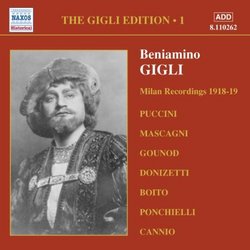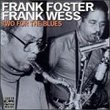| All Artists: Gigli Title: Great Singers: Beniamino Gigli Edition 1 Members Wishing: 0 Total Copies: 0 Label: Naxos Original Release Date: 1/1/2018 Re-Release Date: 10/21/2003 Genres: Pop, Classical Styles: Vocal Pop, Opera & Classical Vocal, Historical Periods, Modern, 20th, & 21st Century Number of Discs: 1 SwapaCD Credits: 1 UPC: 636943126226 |
Search - Gigli :: Great Singers: Beniamino Gigli Edition 1
 | Gigli Great Singers: Beniamino Gigli Edition 1 Genres: Pop, Classical Benno Moiseiwitsch was born in the so-called cradle of Russian pianism, Odessa, in 1890. This seventh volume of the recordings of Moiseiwitsch consists of Russian works by composers whose music had a foot in both the ninet... more » |
Larger Image |
CD DetailsSynopsis
Album Description Benno Moiseiwitsch was born in the so-called cradle of Russian pianism, Odessa, in 1890. This seventh volume of the recordings of Moiseiwitsch consists of Russian works by composers whose music had a foot in both the nineteenth and twentieth centuries. Moiseiwitsch?s style of playing is rooted in the nineteenth although he lived the greater part of his life in the following century. As well as Rachmaninov, with whose music he had a great affinity, Moiseiwitsch knew another composer-pianist exile, Nikolai Medtner. Medtner?s music has rarely been popular with pianists or the public, and Moiseiwitsch was doing his friend a service when he recorded his Sonata, Op. 22. Similar CDs
|
CD ReviewsThe Young Golden-Voiced Gigli J Scott Morrison | Middlebury VT, USA | 11/11/2003 (5 out of 5 stars) "'Gigli was something less than a great artist; but as a singer pure and simple he was among the greatest.'--Desmond Shawe-Taylor That expresses my opinion precisely. This is the first of a series of issues that will publish in order the 'singles' made by Gigli, that is to say, the recordings that were not part of complete opera sets. And this issue, from 1918-1919, is from the very beginning of his career when the voice was fresh and gloriously beautiful. The _sound_ of his voice is, to me, that of the perfect tenor. Unfortunately, Gigli was not the best musician in the opera house and later in his career he adopted mannerisms that became annoying. There is very little of that here, although in 'E lucevan le stelle' (from Tosca) there are the intrusive sobs and portamenti that later became such a part of his style. Still, it's a wonderful performance otherwise; one is swept up by the ardor of young Cavaradossi. The one phrase, 'O dolci baci,' is, I think, without parallel in any other recording I've ever heard.The very first notes of the first recording, 'Dai campi, dai prati', from Boito's 'Mefistofele,' shock us with their beauty. This is fervent, eager, spontaneous singing at its best. The same is true of the duet from the same opera, 'Lontano, lontano' (in spite of squawly soprano Gemma Rosini). The aria from the opera's Epilog, 'Giunto sul passo esteremo,' demonstrates not only the beauty of the tenor's voice but also his ability to express a text. The duet from Act I of 'Mefistofele' ('Se tu mi doni un'ora di riposo') where Gigli is joined by black-voiced basso Carlo Scattola, is impassioned. The ease and grace of 'Apri la tua finestra' from Mascagni's rarely-heard 'Iris' is remarkable. I had to play it three times in a row the first time I listened to the CD. I will admit I'd never heard the aria before. Another Mascagni aria, 'Ah! ritrovarla nella sua capanna' from 'Lodoletta,' was more familiar to me; its mystery and longing are palpable here.The opening phrase of 'Cielo e mar' from 'La Gioconda,' so difficult to sing fluidly, is sung with ease and utmost security by Gigli. The same opera's duet with Barnaba (a role sung heroically here by baritone Dario Zani), 'Enzo Grimaldi, Principe di Santafior' is stirring. 'Salut, demeure chaste et pure' (here sung in Italian) from 'Faust' will melt your heart (and Marguerite/Margherita's, too, I'm sure). This is followed by the two big duets ('Laisse moi' and the heart-breaking 'Oui, c'est toi que j'aime,' sung in Italian); in these he is joined by Maria Zamboni, soprano. suitably fragile but not Gigli's equal. Finally, we have the big favorites, 'O soave fanciulla' from 'Bohème,' and 'Mamma, quel vino è generoso' from 'Cavalleria Rusticana,' both with Zamboni, recorded Christmas week of 1919, just before Gigli was to sail for America to make his début at the Met. A fitting end to this dazzling CD.The orchestra is conducted by Carlo Sabajno. The sound is quite good, considering the period; there is some hiss but transfer engineering wizard, Mark Obert-Thorn, has done his usual impeccable job of transforming the sound into more than acceptable shape. Naxos continues to perform a mitzvah by issuing the now-large series of historical recordings featuring the work of Obert-Thorn and of his brother wizard, Ward Marston. Huzzah, Naxos!Recommended.Scott Morrison"
|



